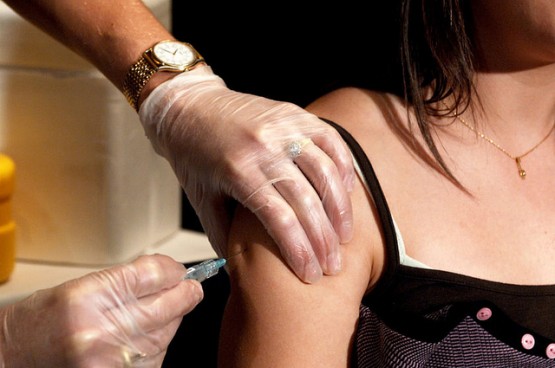As August comes to a rapid close, ADRLF joins many voices to devote special focus to National Immunization Awareness Month.
Last year’s measles outbreak, which affected 668 people in 27 states around the United States, is a stark reminder of the importance of vaccination. This month, the Center for Disease Control (CDC) highlights the role of vaccines, declaring August as National Immunization Awareness Month. According to the CDC, “Vaccines are among the safest and most cost-effective ways to prevent disease.” This is especially true for children, who are highly vulnerable to infectious diseases — that have already been successfully controlled through immunization — and who are easily exposed to contaminated settings from classrooms to playgrounds.

Don’t hesitate. Vaccinate. (Photo credit: hpv vaccine, Art Writ)
Specific vaccinations protect infants and children from diseases that are actually preventable, including: measles, chicken pox, and hepatitis A and B. It also prevents them from contracting deadly complications such as pneumonia (from chicken pox), encephalitis (from measles), and liver failure (from hepatitis).
Vaccines are particularly beneficial against asymptomatic diseases like hepatitis A and B, which may affect both children and adults — without showing any recognizable symptoms.
To protect your children from hepatitis A, the CDC recommends that caregivers consult their children’s pediatricians, and from there, the vaccines may be administered in two doses: the first dose is given to children at 12-23 months old, and the second dose to be given at 6 to 18 months after the first dose.
The Hepatitis B vaccine is administered in three doses, given on the following periods: at birth, at 1-2 months old, and at 6-18 months old.
As some parents have expressed doubts against vaccination, especially of infants; the CDC’s vaccination guidelines offer some flexibility according to children’s age. For example, parents who are concerned about dosage and number of shots for babies can work with their health care professional to adjust the vaccination schedule.
Booster shots and other vaccines are recommended for older children and adults — depending on risk factors such as vaccination history, travel, occupation, allergies, and health status.
For parents and caregivers, learn more about vaccines here
For health care professionals, promote immunization with these resources
Everyone, know more about your local vaccination programs here
Wishing you fun, safe, healthy rest of the summer from ADRLF!






























